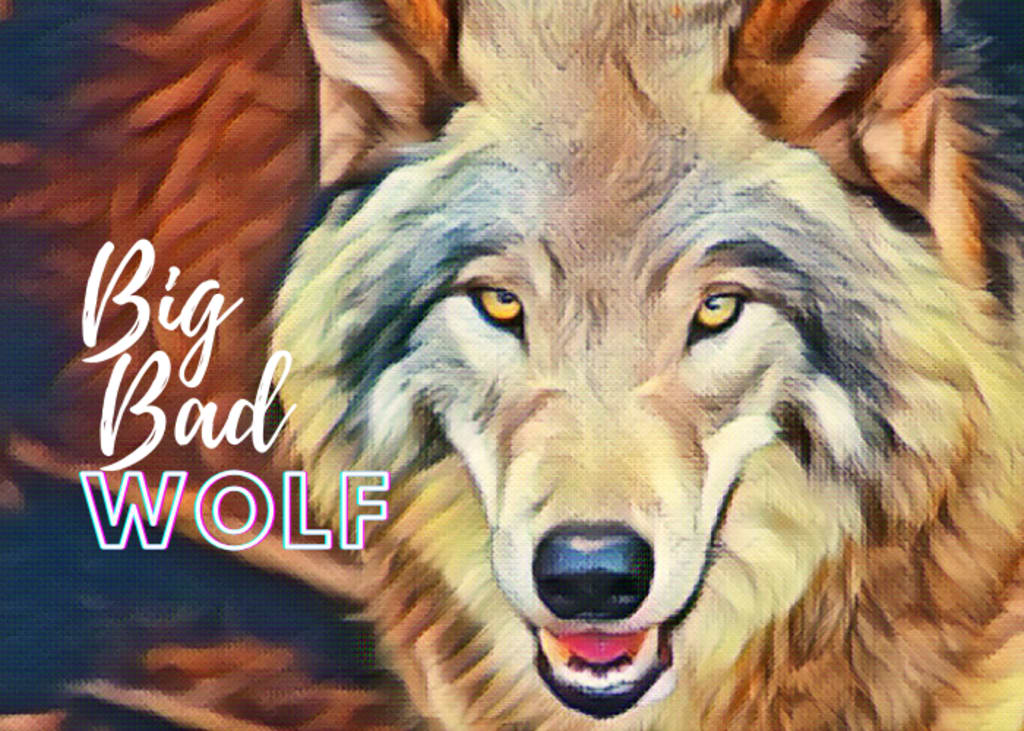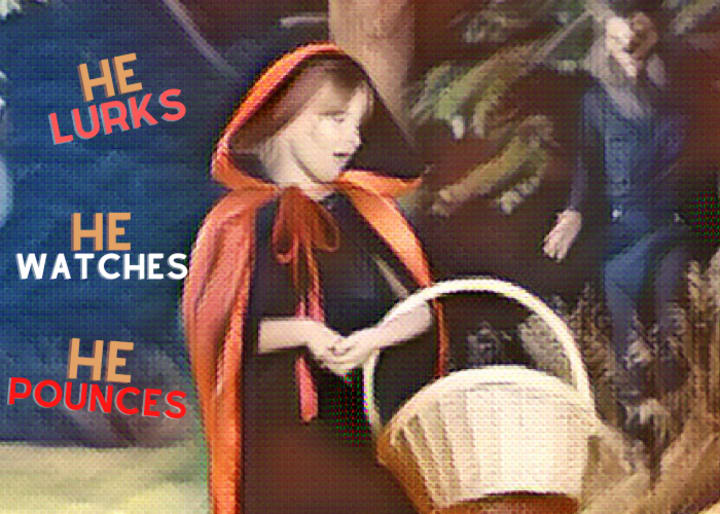10 Life Lessons From Deadly Encounters with the Big Bad Wolf
He harassed three little pigs and blew 2 of the brothers’ houses down, he stalked Little Red and ate her grandmother, and swallowed a mother’s 7 kids, straight no chaser. The guy was just bad news!

The Big Bad Wolf is a villain in most children's tales such as the Brothers Grimm. The Big Bad Wolf had a terrible reputation. He harrassed The Three little pigs and blew down 2 of the brothers’ houses and they had to go live with their uptight know-it-all brother with the brick house.
In some tales, he killed the first two pigs and had pork every night for a month. It was reported he stalked Little Red and ate her grandmother. Then, some folks around the way said he swallowed a mother’s 7 kids, straight no chaser. The guy was just bad news!
But still, are there some important life lessons carefully crafted in these deadly encounters?

As human beings, we are no longer in the wild, but we live among predators who can be as wicked as the Big Bad Wolf. We face problems and fears which can feel dangerous and impossible to overcome.
Consequently, can we learn from Little Red Riding Hood, the Three Little Pigs, Seven Kids, the Big Bad Wolf, and other supporting characters in The Grimm Brothers' Children's and Household Tales?
What are 10 life lessons we can extract from deadly encounters with the Big Bad Wolf?
10) Yes, a predator is a predator.
“When someone shows you who they are, believe them, the first time.”--Maya Angelou
You may not be able to judge a book by its cover, but after turning a few pages you get several clues. First, his name is Big Bad Wolf. If he's coming over for dinner, you'll probably be the dinner. In life, we can be consumed by something much larger than us. We don’t always see it, but when you do--run!
Instinctive Body Signals
Humans are just as instinctive as other animals in the Animal Kingdom. Though we may no longer live in the wild, we may have shelter, and a Starbucks on every corner, we still have instincts. Our bodies signal and warn us instinctively when we are in the proximity of danger. As such, the University of Massachusett states in an article entitled Five Instincts You Shouldn't Ignore:
“Negative or warning instincts are often accompanied by:
- Icy cold hands and feet; an overall chill
- Twinges or clenching pain in gut or chest
- Nausea or upset stomach
- A sense of being on “high alert”
- Fatigue or loss of energy
- Headache
Adapted from Second Sight by Judith Orloff, M.D.
Predators are Deceptive
Perhaps, we want to take a walk on the wild side. We may want to test the limits by poking the sleeping beast or maybe we think someone isn't as bad as others make them out to be. We can make all the excuses in the world, the Big Bad Wolf may have been a neglected and hungry child with no one to care for him--but oh, what big teeth he has.
Our society has predators. Our society has physical, sexual, financial, and psychological predators. A predator is a predator. We can give a predator all the soft warm attributes we want. We can understand his plight in life, but the nature of a predator is to harm.
According to, Katherine Ramsland, a professor of forensic psychology at DeSales University in Pennsylvania, and the author of over 66 books stated in her article entitled 6 Things the Most Dangerous Predators Already Know About You, “you must understand how predators can use common human tendencies against you.”
Predators study their marks. They see your weakness and will use your weaknesses against you. If they see a lack of confidence, they take note. If they see guilt, they will use it.
9) Move in Silence, Don't Reveal Everything
You just don't know when a predator is lurking; therefore, you must learn to move in silence--it's the key to your survival!
Remember what happened in Little Red Ridinghood? When she told the Big Bad Wolf where her grandmother lived, he went to the old lady's house and decided he wanted Grandma Gumbo. By the time Little Red arrived, her grandma was in a pot of rue covered in onions, crawfish, chicken feet, and andouille sausage.
Your Life Shouldn’t be An Open Book
Sometimes it is best to play your cards close to your vest (I'm a poet and I know it). You don't have to go into detail about your business with everyone you meet.
Especially, online. Several people online have come back from vacation and their homes were robbed. Not because the robbers were watching their house. The robbers saw their social media profile blatantly stating, “We’re in Costa Rica, wahoo!” Addresses and phone numbers are there for everyone to see.
Norton, a privacy protection service, gives this advice about protecting yourself on social media:
- Read the social media site’s terms
- Don’t share private information like your full name and address
- Be careful about posting photos on social media sites specifically photos that reveal school and work affiliations
- Consider carefully what personal details you provide in your profile
- Be aware of privacy concerns in the news (the Cambridge Analytica story).
8) Learn to Camflouge
You have animals in nature who protect themselves by blending in with their surroundings. In the case of a predator, you should be undetectable. It gives you time to escape danger.
Little Red Ridinghood decided to wear a big red hoodie while walking through the woods, it's as if she was waving a flag and shouting: "Hey Mister Wolf, I'm over here, dinners on me."
We can call attention to ourselves at our most vulnerable states and times. We have those in our society who have developed a predator mindset. These individuals watch and wait for the opportune moments to strike. Never stick out like a sore thumb.
7) Build Strong
Whatever you do in life, build strong. Whether it's a business, a house, our character, or a relationship, we have to gather and use the right materials to build strong. How do you build strong?
Let’s take the story of The Three Little Pigs. Each of the three pigs used different building materials to protect themselves from the Big Bad Wolf. The first little pig built his house out of straw, which was easily blown down by the wolf. The second little pig built his house out of sticks, which the wolf was able to blow it down as well. The third little pig built his house out of bricks, which the wolf couldn't blow down.
In life, we are constantly being tested and tried. We must learn how to build for victory and not continuously set ourselves up to be the victim or even a survivor. We must be willing to put in focused work, use the right materials, and build strong brick by brick. It takes time and commitment to build strong.
Sure, you can throw up a house of sticks in a week, but what happens when the Big Bad Wolf rolls into town craving baby back ribs.
6) You Can't Outrun a Wolf or your problems.
You can’t outrun a wolf and you can’t outrun your problems. Oftentimes, our problems can look like the Big Bad Wolf and we can feel like Little Red Ridinghood, preyed on, fooled, bamboozled. However, we have to acknowledge our role in creating the problem. Had Little Red stayed “on the path” as she was told, perhaps her grandmother would still be alive.
We may want to run away from it all, but the Big Bad Wolf knows where you live. He went through all your grandmother’s contacts like a directory of local restaurants.
When problems are big and dangerous, you can't outrun them, nor can you dive into them headfirst. A dangerous problem needs a proactive plan. What's a proactive plan?
It's a stealth plan. A strategic plan. You are not fooled by what's in front of you or around the corner. Proactive planning is planning with the future in mind. Instead of reacting, you’ve taken steps to prevent or prepare for what’s ahead. Proactive planning leads to proactive problem-solving. Kepner-Tregoe a 60-year-old Business Consulting Firm which has helped thousands of companies in the United States., Southeast Asia, Europe, and Japan solve problems (even helped the Apollo 13 return from space according to their website) defines Proactive Problem-solving as the ability to identify problems and resolve them before the impacts are felt.
Living your life reacting to every problem is a miserable existence. Reactive problem-solving means we always feel the impact of the problem and the impact can cause long-term effects.
5) Don't underestimate the power of observation
"Oh, grandmother what big teeth you have." Um, hello Little Red, looks like the same fellow you met up within the woods.
Observing your surroundings is paramount. When you are on a new adventure, you have to be aware of your surroundings. If something looks off or seems different, then act accordingly.
In the story The Wolf and the Seven Young Kids, those seven little goats noticed the wolf's voice. They noticed his paws. Those kids were extremely observant.
Become detail-oriented and you will notice when things are out of place, distorted, or dangerous.
4) Preparing Your Child for the Big Bad World.
Did anyone sit down and talk to Little Red about a Big Bad Wolf hanging out in the woods? She may have been told to “stay on the path” but she wasn’t warned about a hairy, sharp teeth, slick-talking, long tail, big-eared, big, bad, wolf. Little Red was sent out into the Big Bad World not prepared for the road ahead.
Oftentimes, parents won’t share the life challenges they’ve experienced and how they overcame them with their children. As much as parents want to protect their children from bad things, bad things do happen. Keeping the lines of communication open between parent and child is essential.
Furthermore, the adage, “It takes a village to raise a child” is true. Every community has protective factors and risk factors. The more protective factors in neighborhoods, families, schools, and faith-based organizations, then the less “at-risk” a child will be to delinquency, teen pregnancy, substance abuse, victims of sexual abuse, and crime. Protective Factors promote the well-being of a child.
3) Evaluate Your Shortcuts in life.
We've all heard the phrase, "there are no shortcuts in life." That's a ton of malarkey. We have plenty of shortcuts in life but you need to know if your shortcut will lead you to where you want to be. If it doesn’t, then “stay on the path.”
Yes, Little Red takes a shortcut through the woods and perhaps never made it home. And if she did, the girl was probably traumatized for life. We can take paths that may seem easy at the start, but the trip may lead us exactly where we don’t want to be.
2) Play on your strengths, not your weaknesses
Too much time and energy can be given to our weaknesses and not enough time is given to our strengths. Predators will count on that. Predators do not seek out the strong. Predators seek out the weakest, the most vulnerable prey, the easy opportunity.
We learned in the story of The Three Little Pigs that the third little pig was able to build his house out of bricks, he played to his strength. Again, The Big Bad Wolf couldn't blow his house down.
A study conducted in 2016 found that people perceive their weaknesses as more malleable than their strengths.
And yet, Michelle McQuaid Ph.D., a well-being teacher in the field of Positive Psychology in her article entitled Ten Reasons to Focus on Your Strengths, McQuaid cites study after study showing a growing body of research supporting that people who use their strengths more at work are happier, less stressed, and feel healthier and more satisfied with their lives.
We can allow our strengths to leverage our weaknesses. We can continue to improve our strengths and feel healthier and more satisfied with our lives.
1) And Still, Sometimes it’s best to “stay on the path.”
Everyone has a risk tolerance level, but that’s personal. Hence, if your risks put someone else at risk, it is best to stay on the path. You can take calculated or educated risks, but when it seeps its way into the lives of others or puts your friends and family at risk, you need to stay on the path and take the safe to grandma's house and back home.
Little Red’s decision to go skipping through the woods instead of taking the path to her grandmother’s house costs her grandmother her life. And if Little Red ever made it home, she was traumatized.
In conclusion, while this story was a bit tongue-in-cheek, we can find some important life lessons from the deadly encounters with Big Bad Wolf.
As it happens, a little bit of preparation, implementing important life skills, and invoking some common sense goes a long way in life and will help you survive the big bad wolves that may come your way.
Sources
"Grimm Brothers' Home Page - University of Pittsburgh." https://sites.pitt.edu/~dash/grimm.html. Accessed 17 Dec. 2021.
"Grimm Brothers' Children's and Household Tales (Grimms' Fairy Tales)." https://sites.pitt.edu/~dash/grimmtales.html. Accessed 18 Dec. 2021.
Five Instincts You Shouldn't Ignore | UMatter at UMass." https://www.umass.edu/umatter/listen/five-instincts. Accessed 10 Dec. 2021.
"6 Things the Most Dangerous Predators Already Know About You." 16 Sep. 2016, https://www.psychologytoday.com/us/blog/shadow-boxing/201609/6-things-the-most-dangerous-predators-already-know-about-you. Accessed 10 Dec. 2021.
"Tips for protecting your social media privacy - Norton." https://us.norton.com/internetsecurity-privacy-protecting-privacy-social-media.html. Accessed 18 Dec. 2021.
"Proactive Problem Solving and Creating Non-Events - Kepner Tregoe." https://kepner-tregoe.com/blogs/proactive-problem-solving-and-creating-non-events/. Accessed 18 Dec. 2021.
"Protective Factors to Promote Well-Being and Prevent Child Abuse ...." https://www.childwelfare.gov/topics/preventing/promoting/protectfactors/. Accessed 19 Dec. 2021.
"How to Play to Your Strengths - Harvard Business Review." https://hbr.org/2005/01/how-to-play-to-your-strengths. Accessed 10 Dec. 2021.
About the Creator
Carmellita
A Writer, Poet, and Storyteller--"My Evolution will be digitized" through insightful stories in the digital space. I am writing for the love of writing, to share feelings, thoughts, and ideas, and to connect with other readers and writers.






Comments
There are no comments for this story
Be the first to respond and start the conversation.